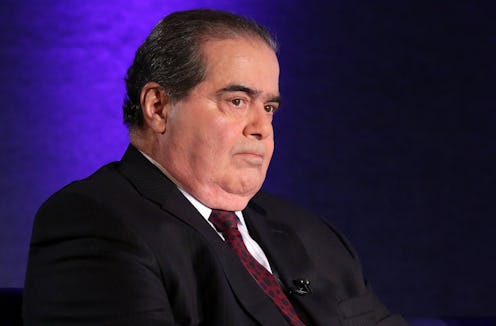News
Will Obama Choose Antonin Scalia's Replacement?
Senior Associate U.S. Supreme Court Justice Antonin Scalia passed away on Saturday of natural causes. His rather sudden death came less than a month before the distinguished judge was set to celebrate his 80th birthday. With Scalia's death, there is now a vacancy in the highest court in the land. Just eight justices now serve, putting the court in a precarious position and essentially forcing the hand of the president to find a replacement. Being that election season is in full swing, many are wondering if Obama will choose Antonin Scalia's replacement or if the task will end up in the hands of an incoming president. Update: According to the New York Times, Obama has indicated that he plans to choose Scalia's replacement promptly.
One person who may have an answer for that is SCOTUS' current Chief Justice John Roberts. Initially nominated by President George W. Bush to replace a retiring Sandra Day O'Connor, Roberts' instead became a shoo-in to succeed Chief Justice William Rehnquist after his death. For Bush to shift Roberts' nomination to fill the vacancy that Rehnquist left rather than O'Connor was fairly easy. Roberts was nominated July 19, and it was not until Sept. 29, 2005 that Roberts was officially confirmed as the 17th Chief Justice, a position he continues to hold to this day. The span between nomination and confirmation is well over five months. Obama still has 11 full months to go before he spends his last day in the White House on Jan. 20, 2017, which is plenty of time for him to nominate and confirm a new justice. And it seems like Obama absolutely intends to nominate a new justice.
Presidential hopefuls — most notably those on the right — recognize the importance of a SCOTUS nomination even outside the constraints of Scalia's sudden death. Scalia was the second oldest member of a court that includes two others in their 70s. Ruth Bader Ginsburg is the oldest associate justice at 82 years old. There will undoubtedly be a SCOTUS shakeup awaiting the incoming president but it is rather surprising that the likes of Ted Cruz and Marco Rubio shirk the legal need for nine justices serving at all times and instead state that they're hoping whoever comes into office after Obama picks a suitable nominee, leaving the Supreme Court down a person for nearly a year.
Tie votes complicate SCOTUS immensely, rendering important legal cases with 4-4 splits automatically in agreement with rulings of lower courts without establishing any precedent whatsoever. Landmark cases essentially stall out. It took Bush until November to decided on a nominee to replace O'Connor. Samuel Alito was nominated on Nov. 10, 2005, and officially confirmed on Jan. 31, 2006. Securing a nominee, going through necessary vetting procedures, and confirming said candidate has been proven to be possible in less than three months. It appears far more likely that Obama will be tasked with picking a nominee and posthaste, though The Hill reported that a Justice Committee member spokesperson has claimed that there is "'zero' chance Obama appoints [a] Scalia replacement."
If Obama indeed picks the next SCOTUS nominee, there is already one candidate whose name is quickly gaining momentum following the passing of Antonin Scalia — Sri Srinivasan. The current D.C. Circuit Court of Appeals Judge has been rumored in the past to be destined for the highest court in the land with USA Today even going so far as to publish a 2013 piece entitled 'Sri Srinivasan: Supreme Court justice in the making?' He was Obama's nomination for his current position and is no stranger to SCOTUS, having argued numerous cases in front of the highest court in the land.
As of this writing, Obama has yet to confirm whether or not he has already begun the process of considering nominees to replace Scalia. The justice's sudden death has left many in shock, thus it may be days or weeks until there are any new SCOTUS nominee developments. For now, the nation is grieving for a distinguished justice whose colorful language will ensure that he is remembered in the annals of history.
